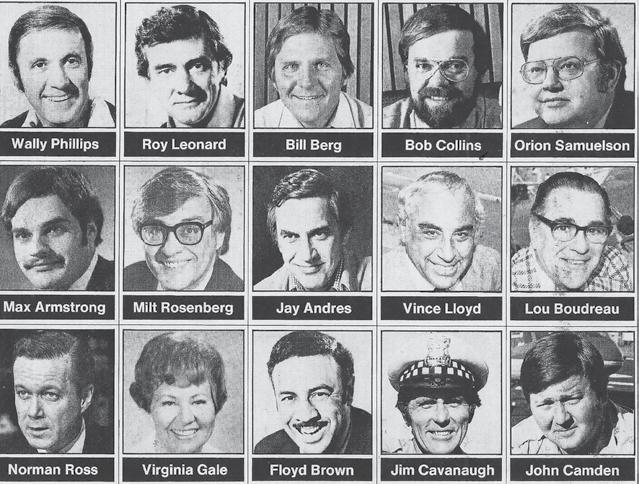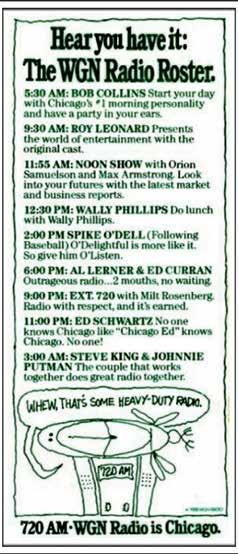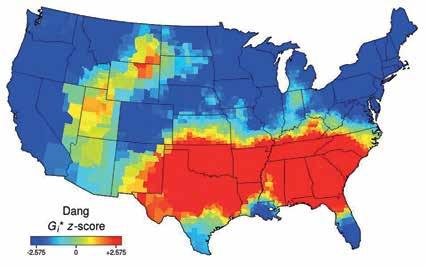I am a terrible listener.
If only I had developed the skill of being able to listen better, with pinpoint accuracy. I have envied that quality in others.
You would think that after more than 45 years of being Orion
Samuelson’s colleague and business partner I would have acquired, just by osmosis, the ability to watch a scene unfold, retain the key takeaway points and then parrot them back to the audience in complete, unfaltering, sentences. I saw him do that on dozens of occasions and often without notes.
Orion was sometimes called “One Take Charlie” by engineers, stagehands, directors, and producers who worked with us. He had that skill, whether on the phone reporting from a meeting he had attended or in the studio to record a broadcast. Unlike his junior associate, Orion rarely needed to take a second try at it. He had quickly absorbed what had transpired and could then, almost flawlessly, share with his listeners and viewers what he thought they should know.
As I have been a speaker at farm meetings, I have often told farmers that before they can spread the news about agriculture, they first need to be good listeners; that before they launch into their elevator speech about the magnificent strengths and contributions of what I refer to as “America’s Most Essential Industry,” they need to show respect and some patience with their target audience. They need to listen. The individual they want to convince may, indeed, have grossly erroneous views of modern production agriculture, but those are likely firmly held
stupid ideas. “You’ll never win them over,” I argue, “by making them feel that what they heard from Aunt Flossie, a girlfriend or a TV celebrity chef is inaccurate.” One must gently plant the seed of doubt into that heartfelt belief, as wrong as it may be. But that can only be done by first listening to that person and hearing what they have to say.
Take it from one who knows. I have too often, I acknowledge, wanted to spout off with my opinions or what I thought I knew about something. Usually, I should have sat quietly and absorbed, instead of interrupting to make sure that I was heard. I have so often thought, “If only I had listened better or had taken better notes, then I would have an even better story.”
Fortunately, I guess I kept my mouth shut long enough to actually hear some of the amazing Stories From The Heartland, and thanks to Diane Montiel and Steve Alexander, who have once again skillfully helped me organize my thoughts, I am doing a second take on this... proving without a doubt, I guess, that I am just not able to be a “One Take Charlie.”

Our world really is so small, enhanced today, of course, by social media and our mobility, as I was reminded by this account shared with me.

Earlier in her career, the woman had been a TV station technical director in Chicago. The man, in his much younger years, had worked as a wire service reporter around the trading pits at the Chicago Mercantile Exchange. They never knew each other before that chance meeting on a bus in Pittsburgh in 2021.
In their brief conversation, they soon realized there was a Chicago connection from those days gone by. Oh, but there was more, he later shared with me. They both personally knew Max Armstrong. Like myself, do you also derive some degree of wonder and pleasure from how truly small our world is?
Now, about that remote work... What are we missing?
It was 1999 when I built a radio broadcast studio in our house 25 miles west of Chicago’s Loop. Through the wonders of technology of that era, you could not tell that I was not right there in the Michigan Avenue studios of WGN Radio during parts of those long days of our agriculture and stock market coverage. I sure was grateful that the setup permitted a hybrid work routine, allowing me to be home more. Up until this time I had spent 20-plus years side-by-side and face-to-face daily with other broadcasters in the radio station.
I often think of the experiences I would have missed, though, and the knowledge I would not have gained, had I not been right there in the workplace during those early years of my career. Whether walking the hallways of WGN, or parked in someone’s cubicle for a few minutes or sitting in the studio during commercial breaks, there was so much I absorbed from the seasoned pros in the business just by being there alongside my colleagues.

My buddy Orion Samuelson and I have a lengthy record of working with the great people of the farm equipment industry, I am proud to say.
Orion had been at WGN Radio-TV in Chicago just about three years before awarding this new combine to a Central Illinois farm family. Yes, it was 60 years ago this summer.

Speaking of equipment, I’ve long had this fascination with gauges and meters. The old analog dials, as shown on the next page, let you check to see where the needle is. If it’s functioning correctly, and if you read it accurately, you pretty well know how that machine is doing.
I vividly recall Dad instructing me to be vigilant in watching those gauges. “Don’t let that thing get too hot.” “Check to see if it’s charging,” Jim would advise me.
Just curious. Do you have a favorite “gauge” you regularly check, perhaps monitoring your health or wealth or your personal or professional performance?

Now this is a throwback, for sure. It brings back a flood of memories of the great folks we worked with in the WGN Family and the thousands and thousands of people who considered us members of their families... and told us so.
WGN Radio has been very special that way. The listeners congratulated us and shared in our joys, and they let you know they were right there with you on those tougher days.
David Ocar, thanks for being such a WGN fan and pulling together these lasting, wonderful memories.








I love maps, and as I’ve explained before, it goes back to Mom hanging the National Geographic insert maps on the wall in the bedroom that my brother and I shared.
This one made me laugh when I found it: the regional usage of the word “dang.”
You don’t get much “dang” in Wisconsin, but you’re knee-deep in “dang” in Alabama. And my Southern Indiana roots, with close proximity to Kentucky, shoved me into what I’d call the occasional “dang” category.


